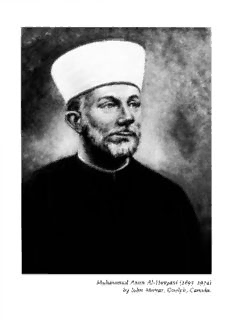
The Mufti of Jerusalem: Al-Hajj Amin Al-Husayni and the Palestinian National Movement PDF
Preview The Mufti of Jerusalem: Al-Hajj Amin Al-Husayni and the Palestinian National Movement
Muhammad Amin Al-Husyani (1595-1974] by John Mattar, Guelph, Canada. The Mufti of Jerusalem Al-Hajj Amin al-Husayni and the Palestinian National Movement Philip Mattar Columbia University Press NEW YORK 1988 Columbia University Press New York Guildford, Surrey Copyright © 1988 Columbia University Press All rights reserved Printed in the United States of America Library of Congress Library of Congress Cataloging-in-Publication Data Mattar, Philip, 1944- The Mufti of Jerusalem : Al-Hajj Amin al-Husayni and the Palestinian national movement/Philip Mattar. p. cm. Bibliography: p. Includes index. ISBN 0-231-06462-4 (alk. paper) 1. Uusayni, Amin, Grand Mufti of Jerusalem, 1893-1974. 2. Palestinian Arabs—Biography. 3. Politicians—Palestine— Biography. 4. Jewish-Arab relations—1917-1949. 5. Palestine— History—1917-1948. I. Title. DS125.3.H79M37 1988 956.94'4—dci9 87-33314 CIP Clothbound Columbia University Press editions are Smyth- sewn and printed on permanent and durable acid-free paper Book design by Ken Venezio To Evelyn and Christina Contents Preface xi 1. The Making of a Palestinian Nationalist: The Formative Years i 2. Rise to Religious Power 19 3. Political Struggle Over the Western Wall, 1928-1929 33 4. The Politics of Moderation and the General Islamic Congress 50 5. The Arab Revolt: The Challenge 65 6. The Arab Revolt: The Response 73 7. Iraq's Quest for Independence, 1939-1941 86 8. The Nazi Years 99 9. Decline of Power 108 10. The Mufti of Jerusalem and the Politics of Palestine: An Overview and Assessment 115 Notes 127 Bibliography 147 Index 155 Illustrations Frontispiece: Muhammad Amin Al-Husyani {1895-1974) by John Mattar, Guelph, Canada. These illustrations appear as a group after page 80. As an Ottoman officer in 1917. Two of the Mufti's aides: Jamal al-Husayni (right) and Emile al-Ghuri (left), London, 1947. Al-Hajj Amin al-Husayni (right) and King Faysal of Iraq (left), Jaffa Har bor, 1925 (W. Khalidi, Before Their Diaspora), The Arab Higher Committee, formed April 1936. Front row, left to right: Raghib al-Nashashibi, al-Hajj Amin al-Husayni, Ahmad Hilmi, 'Abd al- Latif Salah, and Alfred Roch. Second Row, left to right: Jamal al-Husayni, Dr. Husayn al-Khalidi, Ya'qub al-Ghusayn, and Fu'ad Saba (W. Khalidi, Before Their Diaspora), The Mufti (far right, front row) standing with Musa Kazim al-Husayni (center) and Raghib al-Nashashibi (left) as members of the Palestinian delegation, London, April 1930 (W. Khalidi, Before Their Diaspora). In Lebanon in 1949. X Illustrations With Jamal 'Abd al-Nasir, President of Egypt (right) and Shukri al-Quwa- tli, President of Syria, Cairo, 1958. The Mufti with King Husayn of Jordan, Amman, 1967. In Beirut, June 1974, weeks before the Mufti's death. Preface Muhammad Amin al-Husayni (1895-1974), the Mufti of Jerusalem, was the principal leader of the Palestinian national movement and a popular personality in the Arab world during most of the years of British rule over Palestine (1917-1948). Yet the accounts of his life are barely adequate. The absence of a balanced consideration of al-Husayni's political career is not remarkable in view of the passion his name has always inspired. The biographers of the Mufti, also known as al-Hajj Amin, often told us more about themselves than about the Palestinian leader. They were written by Jewish nationalists, such as Moshe Pearlman, Joseph Schecht- man (a Revisionist Zionist), and Eliahu Elath who attempted to vilify him and discredit his movement; by Arab nationalists, such as Zuhayr al-Mar- dini, who lauded him and his cause; or by German national socialists who portrayed him as the Muslim leader seeking to liberate the Arab and Is lamic lands from British oppression. The accounts were so partisan and polemical that the historical al-Husayni and the movement he led were scarcely discernible. These works were flawed further by their meager use of oral and un published primary sources, and by the lack of familiarity with the Mufti
